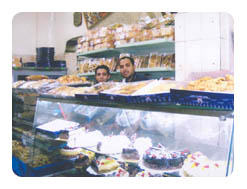
In between Ramleh and the city center, the neighborhoods of Chatby, Ibrahimieh, Sporting and Cleopatra had also been burgeoning, and the population was heavily composed of Greeks, especially in Ibrahimieh. In their midst, the landmark bakery Fino was opened on the tram in Camp Caesar (alternatively spelt Cesar and pronounced Chezar) in 1948. Since it was established by Haj Mohamed Hassan and Co, it has remained within the same family and partners.
It originally sold what is called Afrangi, or Fino, bread, which means Frankish or foreign bread. These are the long loaves, somewhat like French bread but with a less crunchy crust, as opposed to the local pitta bread. In those days, the loaves were not sold individually, as they are today, but by weight, which was then the wekka.
As it was established in a cosmopolitan neighborhood, where the inhabitants were mainly Greeks and Italians, and served neighboring Chatby and Ibrahimieh as well, it gradually expanded the business and catered to a variety of demands, serving bakeries for Greeks, Italians and Egyptians alike. Pastries and gateaux were introduced, at 10 milliemes the piece (now it is a few pounds the piece).
There were also special products for special occasions. During the Moslem month of fasting, Ramadan, special bread was offered called Bread for Fasting, while during the Coptic fasts bread made with vegetable oil was sold. For the Moslem and Coptic feasts ka’ak stuffed with dates and agamia (a form of loukoum) and biscuits would be prepared. In Christmas Finikia and Vasilopita (Christmas cookies and cakes) were done specially for the Greeks, and Panitone for the Italians. In Sham el Nessim a cake decorated with eggs was the specialty of the season, and a certain brioche was made for the fortieth day of mourning.
It is said that Anwar el Sadat, the late Egyptian president, liked to order Chrissini (bread sticks) from Fino for breakfast, without the sesame.
An anecdote related by Samir Abdel Aziz, sales manager at Fino, goes as follows: in the early days of Fino, a foreigner, khawaga, came into the bakery with a bag full of crabs. He insisted on baking the crabs in the oven. So the crabs were laid out on the tin tray and shoved into the furnace. The khawaga waited patiently, with another bag full of cold Stella beers, for his meal. When the tin tray was finally brought out, it was empty! The crabs had apparently been alive, and had preferred to commit suicide and burn in the oven rather than become the khawaga’slunch!